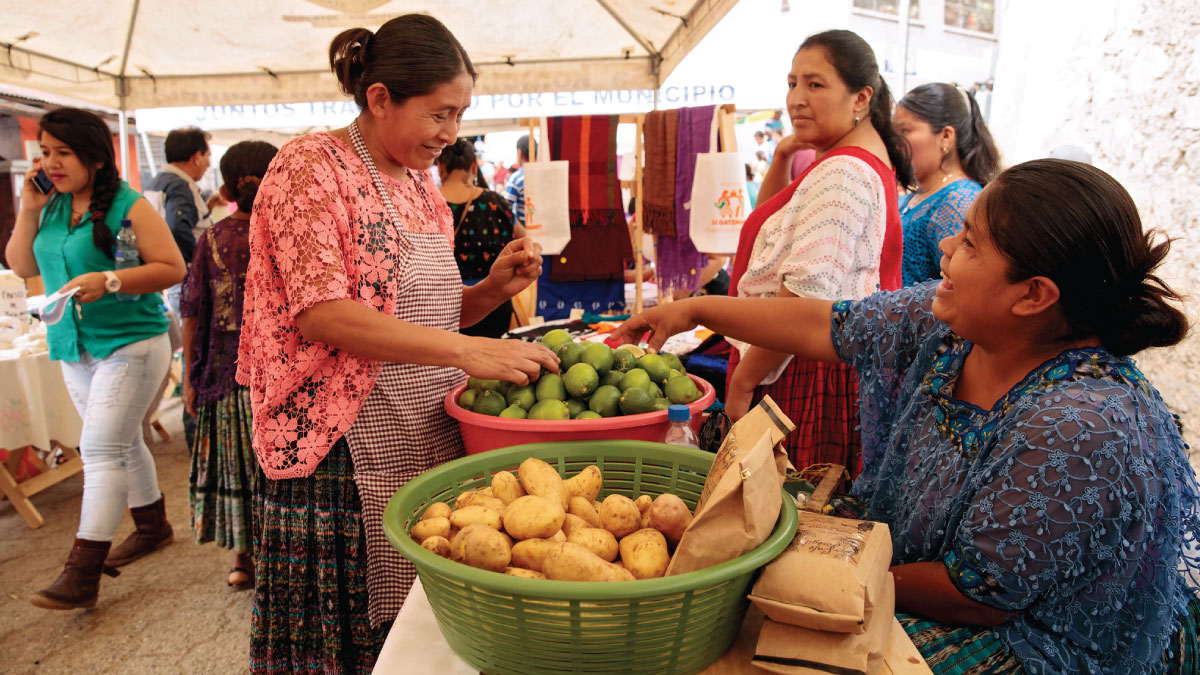Participants from around the world submitted essays on the nexus between trade and gender, as part of an UNCTAD capacity-building initiative.
Indigenous women selling fruit and vegetables at a local market in Guatemala. Empowering women in informal trade helps reduce poverty, create jobs, and drive economic growth. © UN Women/Ryan Brown
Milica Pandzic, a researcher from Ecuador, won an essay competition at a high-level panel during the UNCTAD15 Gender and Development Forum held from 26 to 28 September.
Her essay (in Spanish) examined the space to leverage stronger gender considerations in trade agreement negotiations. She emphasized that such considerations are crucial to a more inclusive socioeconomic recovery from the COVID-19 pandemic.
Ms. Pandzic was among four finalists chosen by a group of experts on international trade and gender issues in the competition organized by UNCTAD, which started in July 2020.
"It was hard to make the selection, nominate the four finalists, and ultimately choose the winner," said Simonetta Zarrilli, who heads UNCTAD’s programme on trade, gender and development.
Participants from around the world submitted essays exploring the nexus between trade and gender in specific national and regional contexts, accompanied by data and analysis of new policy initiatives.
“They provided an extremely valuable source of first-hand information on this relatively new area of work for many countries and institutions," Ms. Zarrilli added.
‘Amazing and extremely insightful’ experience
Milica Pandzic
The initiative was part of UNCTAD’s series of online courses aimed at boosting knowledge on trade and gender.
"The course was amazing and extremely insightful,” Ms. Pandzic said. “Trade and gender is now one of the topics I research the most.”
She added: “I will keep researching and supporting initiatives to better understand the linkages between international trade and gender equality to build back better in my country, Ecuador."
So far, this capacity-building initiative has delivered 15 courses in English, French and Spanish.
“Although the [gender and trade] issue has received increased attention in recent years, the UNCTAD programme continues to be the main capacity-building provider in this area, and there is a demand for further dissemination of the research produced and systematized by UNCTAD," said Aitor Perez, an external expert who evaluated the initiative.
UNCTAD plans to expand the initiative, mainly funded by Finland, by developing new courses with additional regional and thematic focuses.
"UNCTAD has done an excellent job in analysing the trade and gender nexus, and including it in its online courses,” said Finland’s minister of trade and development, Ville Skinnari, during the forum.
“The external evaluation of the courses has been very positive, and I wish to congratulate UNCTAD on this achievement and encourage it to go further in this field," Mr. Skinnari added.
New module focusing on world’s poorest nations
The latest online course in July had 170 trainees from 52 nations, 25 of which are among least developed countries (LDCs).
This course featured a new teaching module to analyse challenges women face in the LDCs, such as discriminatory laws and social norms; limited access to productive resources and technology; and inadequate opportunities for education, training and skill development.
“Most women engage in informal cross-border trade. Implementing policies to facilitate such trade and increase women's share in it will help develop the whole country,” said Ouru Abdel Tassou from Benin, who participated in the course.
The course was developed in partnership with the Enhanced Integrated framework, which supports LDCs to overcome trade-related constraints.
Fairer, more inclusive trade policies
Participants in the online training said they gained insights into women’s role as economic agents in various sectors.
“This will be helpful in understanding how certain policy interventions might affect women and men differently considering their different roles,” said Dikshya Singh from Nepal.
“Trade policy needs to include gender-sensitive aspects for the empowerment and well-being of women, and for the competitiveness of the economy in general,” said Bienvenu Baolongandi from the Democratic Republic of the Congo.
Monika Vega, a trainee from the Dominican Republic, called on societies to “check and update policies to include women’s considerations in trade liberalization negotiations, organize training programmes for women, give women access to finance, and formalize their status as entrepreneurs.”
Since 2015, some 1,500 trainees from 130 countries have participated in UNCTAD’s online courses on gender and trade. They included scholars, policymakers, civil society actors and trade practitioners. They are now spearheading a gender-responsive trade agenda across the globe.
“An in-depth understanding of how gender inequality has repercussions on trade performance, and how trade can reduce or magnify gender inequality is necessary for an ever-growing community of policymakers committed to promoting gender egalitarian societies through trade policies,” Ms. Zarrilli concluded.
The other three essays that made the final list were submitted by Argentina's Vanina Rinaudo (in Spanish), Benin's Aniké Alsace Odile Akpaki (in French) and Egypt's Mustafa Sakr.


